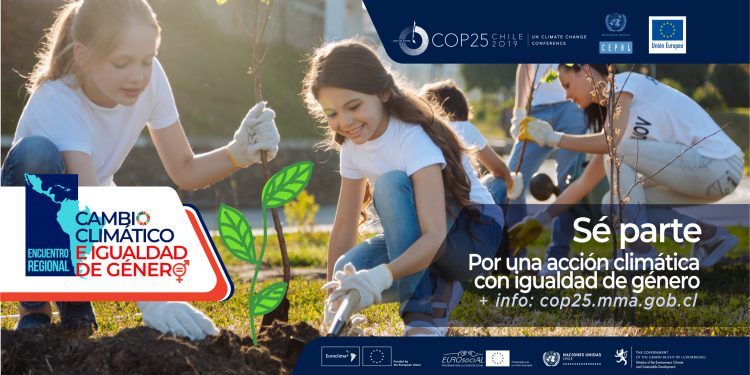With three sessions already held, the Meeting on Climate Change and Gender Equality supported by the EU-EUROsociAL+ and EUROCLIMA Programmes, will now be focussing on the specific session coordinated by the Gender Equality Policies Area on data disaggregated by sex towards climate change indicators with a gender perspective.

With the message that only with gender equality and a more active and equitable participation of women in decision-making will truly effective climate action be possible in Latin America and the Caribbean, the Regional Meeting on Climate Change and Gender Equality began on 2 September, organised by COP25, the European Union through its EUROsociAL+ and EUROCLIMA+ programmes, ECLAC, the United Nations System in Chile and the Grand Duchy of Luxembourg.
The opening ceremony was attended by Carolina Schmidt, President of COP25 and Chile’s Minister of the Environment, Jolita Butkeviciene, the Directorate General for International AssociationsDirector for Latin America and the Caribbean (DG INTPA) of the European Union, Santiago Lorenzo, head of the Climate Change Economics Unit of the Sustainable Development and Human Settlements Division of the Economic Commission for Latin America and the Caribbean (ECLAC), representing Alicia Bárcena, ECLAC Executive Secretary and María Noel Vaeza, Director for the Americas and Caribbean Region of UN Women.
The document that the representatives of the countries will work on throughout the different sessions of the Meeting was also presented, in order to have a general overview to accelerate climate action in the region from a gender equality perspective and implement the Paris Agreement’s Gender Action Plan.
To achieve this, it is hoped to be able to promote the creation of a Network for Gender Equality and Climate Change in LAC, which will work on the roadmap to promote in governments the incorporation of the gender equality approach in climate action.
The working document was presented by the EUROsociAL+ Programme’s Pilar Román, an expert in sustainable development, together with a panel of experts comprising Piedad Martín, Deputy Director of the United Nations Environment Programme, Fleur Newman, Gender Focal Point to the United Nations Framework Convention on Climate Change (UNFCCC) and Gender Focal Point to the UNFCCC and Ana Güezmes, Director of the Gender Affairs Division, Economic Commission for Latin America and the Caribbean (ECLAC), which was moderated by Paula Fuentes, the COP25 advisor.
The experts agreed that gender equality is key in promoting a green and inclusive recovery in Latin America and the Caribbean, one of the regions of the world that was hardest hit by the pandemic and which is also highly vulnerable to the impact of climate change.
Among the structural causes of existing gender inequality in the region are the unequal distribution of domestic responsibilities and care in homes, the informality of work and the wage gap. Among the challenges for the aforementioned gaps are the generation of information for decision-making, political will, capacity building, mechanisms of institutional arrangements and access to climate finance with a gender perspective.
At the opening of the meeting, Carolina Schmidt argued that the gender perspective plays a fundamental role due to the existing structural inequalities in society and that its inclusion in decision-making and overcoming the gender gap in all areas is a fundamental element in order to be able to move forward. “We need decision makers to develop policies for the 2030 agenda. We need more women in the protection of our ecosystems and biodiversity, in the transition to the circular economy and in climate action. When women lead the transformations, entire communities benefit”, she said.
Carolina Butkeviciene highlighted the fact that climate action and the fight for women’s equality are issues that occupy a central place as far as the European Union and its cooperation with the region are concerned. “The evidence shows us that women are disproportionately more vulnerable to the effects of climate change – their independence and ability to adapt is limited by inequalities regarding access to land, natural resources and technology, which, in turn, widens gender gaps. Given such a context, it is essential to promote the integration of the gender perspective in climate change adaptation and mitigation policies in order to move forward with regard to climate action, gender equality and the empowerment of women”, she said.
For Santiago Lorenzo, this is a crucial moment for the Latin American and Caribbean region, the most affected by the pandemic in various aspects, with more than a fifth of worldwide COVID-19-related infections and a third of the deaths. “Setbacks in gender equality are another dimension of the pandemic and this is only a prelude to the climate emergency. We need a transformative recovery in order to invigorate the economy through strategic sectors, improve inclusion and face the climate crisis”, he said.
María Noel Vaeza emphasised that the discussion on climate change has focused on economic and social aspects, without considering the gender inequalities that reproduce and negatively impact women, making it essential to address the problem of change climate from a gender perspective. “Understanding the gender-environment nexus is not only key to better analysing social and environmental inequalities and barriers to sustainable development but also to achieving transformative action”, she said.
Cycle of sessions
The meetings consisted of a cycle of technical sessions during the month of September, of which three have already been held:
– Towards a transformative recovery for sustainability and gender equality
– Climate governance with a gender perspective
– Coherence in climate policy and national progress
The remainder of September will see the following:
- Tuesday, 21 September: Climate finance from a gender perspective
- Thursday, 23 September: Data disaggregated by sex towards climate change indicators with a gender perspective
- Tuesday, 28 September: Women as agents of change
- Thursday, 30 September: High-level closure
More information at: Regional meeting on climate change and gender equality



